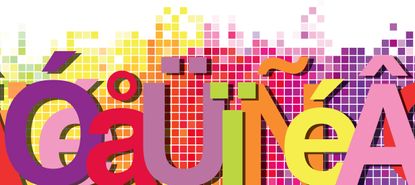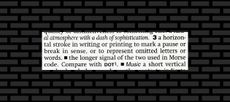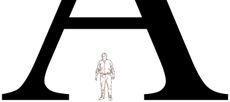In the future, will the English language be full of accented characters?
They may look funny, but they're probably here to stay


Here's something to think about as you sip your latté (or your piña colada) while listening to Beyoncé (or Mötley Crüe): Just how important to the English language are accented characters? And will they withstand the test of time?
We've included accents in some words for a long time; after all, we like to steal words from languages such as French, Italian, and German. But they're not an official part of the English alphabet, partly because they weren't so easy to type or typeset, and partly because … well, they're not English, are they? But the letters w and j and q weren't English originally, either. Nor was the apostrophe. And the letters þ and ð were English until we got rid of them. So is the accent on its way out, or is it seeping in?
Technology has long influenced our use of letters in language. For example, English has always had the sounds we now spell with the letters th, but we used to be able to write them with þ and ð. When printing presses arrived from Europe, their sets of type didn't include those characters, so those characters disappeared. On the other hand, it wasn't until more recent centuries that English speakers (and writers) found it useful to have an official distinction between v and u and between i and j (before then, Julius was just another way of writing Ivlivs) or decided we had a use for the letter w that came from Europe. And we didn't really need q, but it looks so ... Latin! So, the sets of type for our printing presses included those letters.
Subscribe to The Week
Escape your echo chamber. Get the facts behind the news, plus analysis from multiple perspectives.

Sign up for The Week's Free Newsletters
From our morning news briefing to a weekly Good News Newsletter, get the best of The Week delivered directly to your inbox.
From our morning news briefing to a weekly Good News Newsletter, get the best of The Week delivered directly to your inbox.
In other words, we adopt letters for a handful of reasons: usefulness, aesthetics, and because, well, we simply can. We abandon letters when it becomes too difficult to write or print them out.
The apostrophe has a similar history. It was invented in Italy, introduced into French in the early 1500s to indicate a dropped letter (something French does a lot), and then borrowed into English later in the same century to indicate the same kind of thing: I'm, 'tis, can't. It also indicated a dropped e in the possessive, so Shakespeare's play Love's Labour's Lost was originally Loues Labour's Lost because the e was dropped from Laboures but not from Loues (remember that u and v weren't separate characters yet!). But the idea of using an apostrophe before s in all singular possessives — and after s in all plural ones — caught on over time, partly because it helped make some useful distinctions, but also because it made the speaker seem smart. And it was part of our sets of moveable type.
So what about accented characters? If English didn't steal words from everywhere, we probably wouldn't have much use for accents. We could use a mark to distinguish between, for instance, the noun and verb forms of protest (prótest versus protést), but we've gotten along for centuries without it. The New Yorker, probably unnecessarily, lets readers know typographically that it understands how to pronounce coördinate. But when we need to distinguish between rose and rosé, divorce and divorcé, expose and exposé, or resume and résumé, accents start to look very attractive.
They also have a certain exotic charm. As Emmy J. Favilla says in her BuzzFeed style guide A World Without "Whom," "I'm partial to using accent marks any chance I can get, because they are cute." Benjamin Dreyer, copy chief of Random House, makes his opinion clear in Dreyer's English: "Sojourning in a chateau can't be nearly as much fun as sojourning in a château." We have a lot of weird silent letters in English spelling (as in people, isle, phthisis) for no other reason than to display where we pillaged the word from, so we're certainly going to want to keep that extra soupçon of éclat on the façade of jalapeño. Otherwise we would look naive — sorry, naïve. It's no accident that so many accented letters are found in food terms; we take savory delight in what seems exotic.
And yet we just don't see them as truly essential. We no longer put the circumflex on rôle or hôtel. We often implement accents incompletely, rendering carménère (a type of red wine grape) as carmenère, Ångström (a very small unit of measurement) as Ångstrom, and résumé as resumé. And sometimes we add them where they didn't even exist in the source: latté, for instance, from Italian latte, which has no need of the accent because in Italian you always say the e; maté and animé likewise add an accent as acupuncture to rouse a final e that we might otherwise treat as silent, though the source languages had no such need.
Certainly they can be fashionable. The double-dot crown named variously the diaeresis and the umlaut (a name taken from the sound change it signifies, just like accent) is especially popular in branding, where it almost never indicates any difference in pronunciation. Branding expert Nancy Friedman maintains an ever-growing collection of decoratively umlauted names, starting with the band Blue Öyster Cult, progressing through Häagen-Dazs, on through Freshëns and Yogen Früz, and on to Söfft, Melōränge, and iögo.
But, as Friedman has pointed out, "The diacritical marks may make for spiffy logos, but they have a downside: They don't show up in the web address, and they're rarely reproduced in newspaper stories." In fact, accents are against the rules for newspaper stories: The Associated Press Stylebook says flatly, "Do not use any diacritical or accent marks because they garble for some users."
Obviously not everyone agrees with this. The New Yorker would not coöperate with anyone who wanted to take away its precious diaereses. The Chicago Manual of Style, the leading guide for many book publishers, plants its flag squarely in the accent camp: "Words, phrases, or titles from another language that occur in an English-language work must include any special characters that appear in the original language." And, technologically, Chicago is more with the times than the AP: We are not on typewriters anymore; Unicode has made a huge variety of accented characters widely available, and even smartphone users have the means to add every accent you'll find in almost any European language.
But as long as accents are for words "from another language," they're not really part of English. And that means accented characters aren't officially real in this language. At least not yet.
In the end, though, the gatekeepers of orthography are the editors. And the views of future generations of editors, who not only enjoy good typography, but tend to believe in getting things right, are more likely to favor the accent. And those who flatly scorn them risk being passé.
Create an account with the same email registered to your subscription to unlock access.
Sign up for Today's Best Articles in your inbox
A free daily email with the biggest news stories of the day – and the best features from TheWeek.com
James Harbeck is a professional word taster and sentence sommelier (an editor trained in linguistics). He is the author of the blog Sesquiotica and the book Songs of Love and Grammar.
-
 Today's political cartoons - April 13, 2024
Today's political cartoons - April 13, 2024Cartoons Saturday's cartoons - moderate MAGA, automotive politics, and more
By The Week US Published
-
 5 Grand Canyon-size cartoons on the Arizona abortion ruling
5 Grand Canyon-size cartoons on the Arizona abortion rulingCartoons Artists take on a chasm in reproductive freedom, the dangers of an abortion ban, and more
By The Week US Published
-
 Crossword: April 13, 2024
Crossword: April 13, 2024The Week's daily crossword
By The Week Staff Published
-
 10 signature foods with borrowed names
10 signature foods with borrowed namesThe Explainer Tempura, tajine, tzatziki, and other dishes whose names aren't from the cultures that made them famous
By James Harbeck Published
-
 There's a perfect German word for America's perpetually enraged culture
There's a perfect German word for America's perpetually enraged cultureThe Explainer We've become addicted to conflict, and it's only getting worse
By Bonnie Kristian Last updated
-
 The legacy of World War I
The legacy of World War IThe Explainer The Great War ended 100 years ago this month. How does it still shape our world now?
By The Week Staff Published
-
 The death of sacred speech
The death of sacred speechThe Explainer Sacred words and moral terms are vanishing in the English-speaking world. Here’s why it matters.
By Jonathan Merritt Published
-
 The delicate art of using linguistics to identify an anonymous author
The delicate art of using linguistics to identify an anonymous authorThe Explainer The words we choose — and how we use them — can be powerful clues
By James Harbeck Last updated
-
 Dashes and hyphens: A comprehensive guide
Dashes and hyphens: A comprehensive guideThe Explainer Everything you wanted to know about dashes but were afraid to ask
By James Harbeck Published
-
 A brief history of Canadian-American relations
A brief history of Canadian-American relationsThe Explainer President Trump has opened a rift with one of America's closest allies. But things have been worse.
By The Week Staff Published
-
 The new rules of CaPiTaLiZaTiOn
The new rules of CaPiTaLiZaTiOnThe Explainer The rules for capitalizing letters are totally arbitrary. So I wrote new rules.
By James Harbeck Published